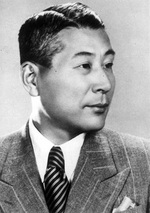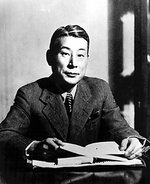Chiune Sugihara
| Surname | Sugihara |
| Given Name | Chiune |
| Born | 1900 |
| Died | 31 Jul 1986 |
| Country | Japan |
| Category | Government |
| Gender | Male |
Contributor: C. Peter Chen
ww2dbaseChiune Sugihara was born on 1 Jan 1900 in Yaotsu, Gifu Prefecture, Japan to physician Yoshimizu Sugihara and Yatsu Sugihara. In 1912, he graduated with top honors from Furuwatari School, and then moved on to Nagoya Daigo Chugaku (now Zuiryo High School). He disobeyed his father's wish for him to become a physician and instead entered Waseda University in 1918 to study English literature. In 1919, he passed the Foreign Ministry Scholarship exam, leading to his entrance into the ministry and the assignment to Harbin, China to study Russian language, Russian affairs, and German language. In the mid-1930s, Sugihara served in the Manchurian Foreign Office as the Deputy Foreign Minister to the puppet state of Manchukuo. In that position, he made the purchase of the Northern Manchurian Railroad for the Japanese government that was shortly after considered to be a great deal for Japan. He quit his position in protest over Japanese mistreatment of Chinese people in Manchuria. In 1935, he divorced his Byelorussian wife Klaudia. Shortly after, he returned to Japan and married Yukiko Kikuchi, with whom he had four sons.
ww2dbaseAfter serving briefly as a translator for the Japanese legation in Helsinki, Finland, Sugihara was given the position as Vice Consul of the Japanese Consulate in Kaunas, Lithuania in 1939. Between 31 Jul and 4 Sep 1940, he issued visas to refugees from Poland and Lithuania through loop holes in the Japanese bureaucracy so that they could attempt to escape from Nazi persecution; many of them were Jewish. Very quickly after, he began to issue visas in direct violation of Japanese customs and immigration laws. He also negotiated with the Russian government to allow the Jews to travel through Russia on the Trans-Siberian railway, though their ticket prices would be at five times the standard price. Many of the refugees would take the railway to Vladivostok in eastern Russian, and then travel to Kobe, Japan by sea, where a small Russian Jewish community existed; others would take another railway trip from Vladivostok to Korea and then board passenger ships to Shanghai, China, which also hosted a Jewish community. On 4 Sep, the consulate was closed. Rumors had it that he was still authorizing visas while boarding the train leaving Lithuania, throwing the signed papers into the crowd so that a few more Jewish families could escape Eastern Europe. The actual number of people he saved was not certain, but most estimates ranged from 6,000 to 10,000.
ww2dbaseAfter Lithuania, Sugihara briefly served with the consulate in Königsberg, Ostpreußen, (East Prussia), Germany before becoming the Consulate General in Prague, Czechoslovakia (until late 1942) and a member of the Japanese legation in Bucharest, Romania. In 1944, he was arrested by the Russians after Romania switched sides away from the Axis alliance, and his family lived in a prisoner of war camp for 18 months. They returned to Japan in 1946.
ww2dbaseIn 1947, Sugihara was asked to resign. The official reason was that the foreign office was being downsized, but some sources, including his wife Yukiko Sugihara, noted that the actual reason was because of his actions in Lithuania which violated orders from his superiors. He moved to Fujisawa, Kanagawa Prefecture, Japan and worked as a manager at an export company. He also worked in Russia between 1960 and 1975 under the pseudonym Sempo Sugihara while his family remained in Japan. In 1968, while in Russia, he was located by Israeli economic attaché to Tokyo Jehoshua Nishri, who was able to escape from Poland because of one of the visas authorized by Sugihara; he visited Israel in 1969 and was greeted officially by the Israeli government. In 1985, he was given the title Righteous Among the Nations by Yad Vashem, Israel's official Holocaust Martyrs' and Heroes' Remembrance Authority, accepted by his wife and son on his behalf due to Sugihara's deteriorating health condition; Sugihara, his wife, and his descendants were given perpetual Israeli citizenship. Later that year, he was quoted in saying the following regarding what motivated him to disobey orders in issuing the visas to refugees.
ww2dbaseSugihara passed away in 1986 in Fujisawa, Kanagawa, Japan. Currently, the Japanese government maintains that Sugihara had not been released from the foreign office out of any disciplinary action, and his actions were officially praised as "courageous and humanitarian".
ww2dbaseSource: Wikipedia.
Last Major Revision: Dec 2008
Photographs
 |  |  |  |
Chiune Sugihara Timeline
| 1 Jan 1900 | Chiune Sugihara was born. |
| 31 Jul 1986 | Chiune Sugihara passed away. |
Please consider supporting us on Patreon. Even $1 per month will go a long way! Thank you. Please help us spread the word: Stay updated with WW2DB: |
Visitor Submitted Comments
12 Feb 2010 08:06:24 PM
Last week I was able to rent this DVD documentary. What a wonderful story of courage and caring. Search under Google and I am sure you will find it to purchase or rent quickly.
In the dark early days of World War II, Japanese diplomat Chiune Sugihara used his power (defying Tokyo's express orders) to rescue Jewish refugees in Lithuania. More than 2,000 Sugihara-stamped passports allowed hundreds of Jewish families to flee to safe havens abroad. Through unprecedented access to Sugihara's family and their personal home movies, photos and papers, the heroism of this man is brought to light. ..
All visitor submitted comments are opinions of those making the submissions and do not reflect views of WW2DB.

- » US State Lawmaker John Winter Caught Using Racial Slur "Jap" and Apologized (11 Jun 2025)
- » Köln/Cologne Evacuated After Discovery of WW2 Bombs (4 Jun 2025)
- » US Women's Army Corps "Six Triple Eight" Awarded with Congressional Gold Medal (30 Apr 2025)
- » Race, Holocaust, and African-American WW2 Histories Removed from the US Naval Academy Library (7 Apr 2025)
- » US Government Plans to Purge WW2 Information (17 Mar 2025)
- » See all news
- » 1,177 biographies
- » 337 events
- » 44,933 timeline entries
- » 1,245 ships
- » 350 aircraft models
- » 207 vehicle models
- » 376 weapon models
- » 123 historical documents
- » 261 facilities
- » 470 book reviews
- » 28,474 photos
- » 365 maps
Thomas Dodd, late 1945
Please consider supporting us on Patreon. Even $1 a month will go a long way. Thank you!
Or, please support us by purchasing some WW2DB merchandise at TeeSpring, Thank you!
1 Oct 2009 02:09:09 PM
Nice